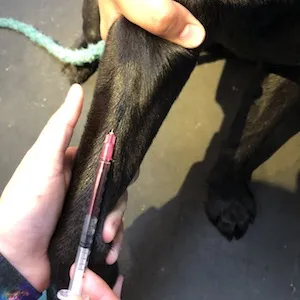Welcoming a new puppy into your home is an incredibly exciting time, filled with joy and endless adorable moments. As a devoted pet parent, ensuring your puppy’s health and well-being is your top priority. Among the many health concerns for young dogs, heartworm disease stands out as a serious and potentially fatal condition. This is why understanding Heartworm Prevention For Puppies is crucial from the very beginning. Early and consistent prevention is key to protecting your furry friend from this insidious parasite.
Heartworms are not just a minor inconvenience; they are long, slender worms that can grow up to a foot long and live in the heart, lungs, and associated blood vessels of infected dogs. This infestation can lead to severe lung disease, heart failure, and significant damage to other vital organs, drastically impacting your puppy’s quality of life. While heartworms can affect various mammals, dogs are a natural host, meaning the worms can mature, reproduce, and thrive within their bodies. The impact of heartworm disease can linger long after the parasites are gone, making heartworm prevention for puppies the most effective and humane approach.
Understanding Heartworm Transmission
The transmission of heartworm disease is a fascinating, albeit concerning, biological process that hinges on the involvement of mosquitoes. Adult female heartworms residing in an infected animal (such as a dog, fox, or coyote) produce microscopic larvae called microfilariae. These microfilariae circulate in the animal’s bloodstream. When a mosquito bites an infected animal, it ingests these microfilariae.
Over a period of about 10 to 14 days, these ingested larvae develop into infective-stage larvae within the mosquito. When this infected mosquito subsequently bites another susceptible animal, like your puppy, these infective larvae are transmitted through the mosquito’s bite wound. Once inside the new host, it takes approximately six months for these larvae to mature into adult heartworms. These adult heartworms can live for several years, continually causing damage to your puppy’s internal systems.

Why Puppies are Particularly Vulnerable
Puppies, due to their developing immune systems and ongoing growth, are just as susceptible to heartworm infection as adult dogs. The American Heartworm Society recommends that puppies be started on a heartworm preventive as early as the product label allows, and no later than 8 weeks of age. The dosage of heartworm medication is based on body weight, and puppies experience rapid growth. This means their weight can change significantly within weeks, potentially moving them from one dosage range to another. It’s vital to consult your veterinarian about anticipating dosage changes and to have your puppy weighed at every veterinary visit to ensure they are receiving the correct heartworm prevention for puppies.
Signs of Heartworm Disease in Puppies
In the initial stages, heartworm disease often presents no obvious symptoms in puppies. This lack of early warning signs makes regular testing and consistent prevention even more critical. As the infection progresses, however, you might observe subtle changes in your puppy’s behavior and health. These can include:
- A mild, persistent cough.
- Reduced enthusiasm for exercise or fatigue after even moderate activity.
- Decreased appetite.
- Unexplained weight loss.
As the disease advances, more severe symptoms can emerge, such as signs of heart failure. If your puppy develops caval syndrome, a life-threatening condition caused by a sudden blockage of blood flow within the heart, you might notice labored breathing, pale gums, and dark or coffee-colored urine. This is a medical emergency requiring immediate veterinary attention.
The Importance of Early and Consistent Heartworm Prevention
Given the insidious nature of heartworm disease and the difficulty in detecting it early, heartworm prevention for puppies is unequivocally the best strategy. The medications available today are highly effective at eliminating the immature stages of the heartworm parasite.
How Heartworm Preventives Work
Whether administered as a pill, a topical treatment, or an injection, approved heartworm medications work by targeting the larval stages of the heartworm. They eliminate the infective larvae transmitted by mosquitoes and the subsequent larval stage that develops within the animal. It’s crucial to understand that these preventives are not designed to kill adult heartworms. Therefore, the medication must be given on a strict schedule to eliminate larvae before they can mature into adults, which can happen in as little as 51 days.
Year-Round Prevention is Key
The American Heartworm Society strongly recommends year-round heartworm prevention for all dogs, regardless of their geographic location. While mosquitoes are less prevalent in colder months, they can still survive indoors or in warmer pockets, posing a year-round risk. Furthermore, many heartworm preventives also protect against common intestinal parasites like hookworms and roundworms, which can also pose health risks to humans. This dual protection makes year-round prevention a comprehensive health measure.
Heartworm Testing for Puppies
While puppies under 7 months of age can be started on heartworm prevention without a test (as it takes at least 6 months for an infection to be detectable), they should be tested approximately six months after their initial preventive visit. Following this, they should be retested six months later and then annually thereafter. Annual testing is vital even for puppies on consistent prevention because it ensures the prevention program is working effectively. No heartworm medication is 100% effective, and factors like a missed dose, vomiting a pill, or a topical medication being rubbed off can leave your puppy vulnerable. Testing is the only way to confirm if your prevention strategy is successful.

What to Do if Your Puppy Tests Positive for Heartworms
Discovering that your puppy has heartworms can be distressing, but the good news is that most infected dogs can be successfully treated. The treatment process aims to stabilize your puppy, eliminate all adult and immature worms, and manage any side effects.
The typical steps involved if your puppy tests positive include:
- Confirming the Diagnosis: An initial positive test will usually be followed by a second, different test to confirm the diagnosis and ensure treatment is indeed necessary.
- Restricting Exercise: Physical activity must be significantly limited as soon as a diagnosis is confirmed. Exercise can exacerbate the damage heartworms cause to the heart and lungs.
- Stabilizing Your Puppy’s Condition: Before treatment begins, your puppy’s overall health may need to be stabilized, which can take several months for severe cases.
- Administering Treatment: This typically involves a series of injections with an approved drug, followed by strict rest. The American Heartworm Society provides guidelines for treatment protocols.
- Follow-up Testing and Prevention: Approximately nine months after treatment completion, your puppy will be retested to confirm all heartworms have been eliminated. To prevent future infections, year-round heartworm prevention must be administered for the rest of your puppy’s life.
Choosing the Right Heartworm Preventive
Your veterinarian is your most valuable resource in selecting the appropriate heartworm prevention for puppies. They will consider your puppy’s age, weight, breed, and any other health concerns to recommend the safest and most effective product. Most heartworm preventives require a veterinary prescription, ensuring that your puppy receives proper medical oversight and that the medication is administered correctly.
Remember, preventative care is not only the safest and most humane option for your puppy but also significantly more cost-effective than treating advanced heartworm disease. By prioritizing heartworm prevention for puppies, you are making a vital investment in their long-term health and happiness, allowing them to grow into healthy, active adult dogs.
What About Flea and Tick Prevention?
While focusing on heartworm prevention, it’s also essential to consider protection against other common external parasites like fleas and ticks. These pests can transmit various diseases and cause significant discomfort to your puppy. Many products are available for flea and tick control, some of which may even be combined with heartworm prevention. Discussing the best options for your puppy’s overall parasite protection with your veterinarian is highly recommended. You can explore the best flea treatment for dogs and learn more about flea prevention for dogs to ensure comprehensive care. For puppies with sensitive skin, exploring flea and tick prevention for sensitive dogs might be a suitable option.
